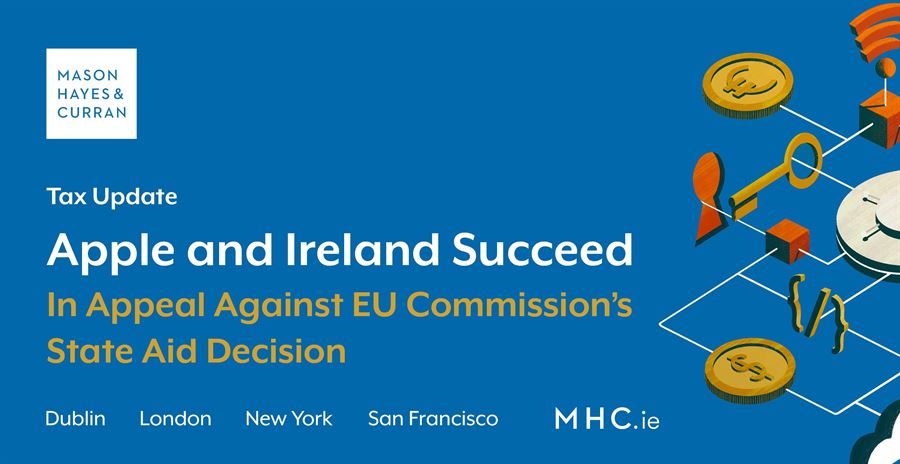Apple and Ireland Succeed in Appeal Against EU Commission’s State Aid Decision

The General Court of the European Union (the General Court) has found in favour of Apple and Ireland by annulling the decision of the EU Commission that Irish tax rulings granted to Apple entities were unlawful State aid.
Background to the decision
In 2016, the EU Commission decided that two tax rulings issued by the Irish tax authorities (Irish Revenue) in 1991 and 2007 in favour of Apple Sales International (ASI) and Apple Operations Europe (AOE) constituted unlawful State aid under EU law. ASI and AOE were companies incorporated in Ireland but not tax resident in Ireland. The contested tax rulings endorsed the methods used by ASI and AOE to determine the taxable profits in Ireland attributable to the trading activity of their respective Irish branches. The Commission calculated that, through these tax rulings, Ireland had granted Apple €13 billion euro in unlawful tax benefits which therefore constituted unlawful State Aid. The decision of the Commission was appealed to the General Court by both Apple and Ireland.
General Court’s decision
The General Court annulled the Commission’s decision on the basis that the Commission did not succeed in proving that ASI and AOE had been granted a selective economic advantage and, by extension, unlawful State aid.
The General Court agreed with the Commission’s approach on some fundamental legal issues such as how the principles of advantage and selectivity are to be assessed, the reference framework of Irish tax law and, in broad terms the application of the ‘arm’s length principle’.
However, the General Court held against the Commission on several points of law and fact. It rejected the Commission’s primary argument that Irish Revenue had granted ASI and AOE an advantage by not allocating the Apple group’s intellectual property licences held by ASI and AOE, and the associated sales income, to the Irish branches of ASI and AOE.
The Commission had made this argument by effectively contending that such an allocation must be the case because ASI and AOE had no employees anywhere else despite their boards conducting business outside of Ireland. The General Court found that approach to be wrong in law and fact. It held that as a matter of law the Commission had to show that in fact the Irish branches AOE and ASI carried out the taxable activity; it was not enough to contend that the Commission had not found such activity elsewhere.
Moreover, the General Court held that the evidence given by ASI and AOE demonstrated that the relevant taxable activities were not in fact carried out by the Irish branches.
The General Court also held that the Commission did not demonstrate that methodological errors – which the Court accepted had occurred in the contested tax rulings resulted in an advantage for AOE and ASI. While the General Court regretted the incomplete and sometime inconsistent nature of the contested Irish tax rulings, those infirmities did not, in themselves, prove the existence of a selective advantage. Therefore such errors did not constitute unlawful State aid. Lastly, the Court also found that the Commission did not prove that the contested tax rulings were the result of discretion exercised by Irish Revenue which had granted a selective advantage to ASI and AOE. Instead it found that the correct analysis of 11 other rulings by Irish Revenue was that the approach depended on the facts and this was not objectionable.
The Commission may appeal the decision to the EU’s Court of Justice before 26 September. However, an appeal is only on points of law and not on findings of fact.
Our view
The General Court’s decision is a victory for the position argued by Apple and Ireland. Because it holds against the Commission on several points of law and fact, it will be a difficult decision to successfully appeal should the Commission decide to do so. In addition, the points won by the Commission are points of law and therefore may themselves be challenged in any cross-appeal and an adverse decision on any of those points could have systemic effects which the Commission would not welcome. This may be another issue considered by the Commission in deciding whether or not to appeal.
While the decision is obviously newsworthy because of the parties, the value at stake and the current global focus on international tax, particularly in relation to multi-nationals and the digital economy, it is noteworthy that in fact many of the points at issue are no longer of relevance for companies doing business in Ireland as the structures and approaches at the heart of the case have not been widely used in recent years. It does, however, clarify that Ireland did not apply any selective treatment to Apple. It underscores Ireland’s reputation as a straightforward and rules-based jurisdiction which remains an eminently suitable location for global companies to establish significant operations.
For more information on the likely implications of this decision, contact a member of our Tax team.
The content of this article is provided for information purposes only and does not constitute legal or other advice.
Share this:



